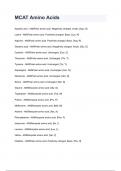Mcat amino acids Study guides, Class notes & Summaries
Looking for the best study guides, study notes and summaries about Mcat amino acids? On this page you'll find 116 study documents about Mcat amino acids.
Page 4 out of 116 results
Sort by
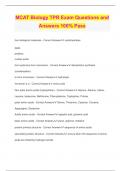
-
MCAT Biology TPR Exam Questions and Answers 100% Pass
- Exam (elaborations) • 68 pages • 2024
- Available in package deal
-
- $13.49
- + learn more
MCAT Biology TPR Exam Questions and Answers 100% Pass four biological molecules - Correct Answer️️ -carbohydrates lipids proteins nucleic acids form polymers from monomers - Correct Answer️️ -dehydration synthesis (condensation) to form monomers - Correct Answer️️ -hydrolysis monomer is a - Correct Answer️️ -amino acid Non polar amino acids (hydrophobic) - Correct Answer️️ -Glycine, Alanine, Valine, Leucine, Isoleucine, Methionine, Phenylalanine, Tryptophan, Prolin...
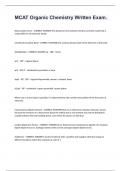
-
MCAT Organic Chemistry Written Exam.
- Exam (elaborations) • 27 pages • 2024
-
Available in package deal
-
- $12.99
- + learn more
MCAT Organic Chemistry Written Exam. Electrostatic Forces - CORRECT ANSWER The attractive force between electrons and the nuclei that is responsible for all molecular bonds. Coordinate Covalent Bond - CORRECT ANSWER One nucleus donates both of the electrons in the bond. Hybridization - CORRECT ANSWER sp - 180° - linear sp2 - 120° - trigonal planar sp3 - 109.5° - tetrahedral, pyramidal, or bent dsp3 - 90°, 120° - trigonal-bipyramidal, seesaw, t-shaped, linear d2sp3 - 9...
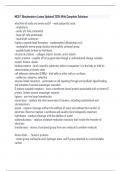
-
MCAT Biochemistry Latest Updated 2024 With Complete Solutions
- Exam (elaborations) • 12 pages • 2024
-
- $21.79
- + learn more
MCAT Biochemistry Latest Updated 2024 With Complete Solutions what kind of acids are amino acids? - weak polyprotic acids - amphoteric - acidic pH: fully protonated - basic pH: fully protonated - neutral pH: zwitterion Explain a peptide bond formation - condensation (dehydration rxn) - nucleophilic amino group attacks electrophilic carbonyl group. - peptide bonds broken by hydrolysis structural proteins - collagen, elastin, keratin, actin, tubulin motor proteins - capable of force ...
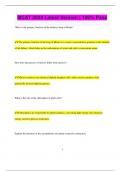
-
MCAT 2024 Latest Version | 100% Pass
- Exam (elaborations) • 135 pages • 2024
-
- $12.61
- + learn more
MCAT 2024 Latest Version | 100% Pass What is the primary function of the kidney's loop of Henle? The primary function of the loop of Henle is to create a concentration gradient in the medulla of the kidney, which helps in the reabsorption of water and salts to concentrate urine. How does the process of mitosis differ from meiosis? Mitosis results in two identical diploid daughter cells, while meiosis produces four genetically diverse haploid gametes. What is the role of the chl...
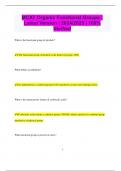
-
MCAT Organic Functional Groups | Latest Version | 2024/2025 | 100% Verified
- Exam (elaborations) • 10 pages • 2024
-
Available in package deal
-
- $10.28
- + learn more
MCAT Organic Functional Groups | Latest Version | 2024/2025 | 100% Verified What is the functional group of alcohols? The functional group of alcohols is the hydroxyl group (-OH). What defines an aldehyde? An aldehyde has a carbonyl group (C=O) attached to at least one hydrogen atom. What is the characteristic feature of carboxylic acids? Carboxylic acids feature a carboxyl group (-COOH), which consists of a carbonyl group attached to a hydroxyl group. What functional g...
MCAT Amino Acids
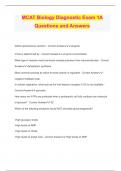
-
MCAT Biology Diagnostic Exam 1A Questions and Answers
- Exam (elaborations) • 48 pages • 2024
- Available in package deal
-
- $13.49
- + learn more
MCAT Biology Diagnostic Exam 1A Questions and Answers Define spontaneous reaction - Correct Answer️️ -exergonic Vmax is determined by - Correct Answer️️ -enzyme concentration What type of reaction most commonly creates polymers from macromolecules - Correct Answer️️ -dehydration synthesis Most common process by which enzyme activity is regulated - Correct Answer️️ - negative feedback loop In cellular respiration, what acts as the final electron acceptor if O2 is not avail...
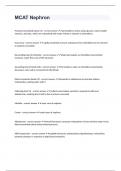
-
MCAT Nephron questions well answered graded A+
- Exam (elaborations) • 2 pages • 2024
- Available in package deal
-
- $9.99
- + learn more
MCAT NephronProximal convoluted tubule (1) - correct answer permeable to amino acids, glucose, water-soluble vitamins, and salts, which are reabsorbed with water. Filtrate is isotonic to interstitium. Vasa recta - correct answer capillary bed that removes substances from interstitium to be returned to systemic circulation Descending loop of Henle(2a) - correct answer Water-permeable; as interstitial concentration increases, water flows out of this structure. Ascending loop of Henle (2b)...
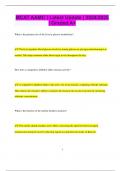
-
MCAT AAMC | Latest Update | 2024/2025 | Graded A+
- Exam (elaborations) • 13 pages • 2024
-
Available in package deal
-
- $10.28
- + learn more
MCAT AAMC | Latest Update | 2024/2025 | Graded A+ What is the primary role of the liver in glucose metabolism? The liver regulates blood glucose levels by storing glucose as glycogen and releasing it as needed. This helps maintain stable blood sugar levels throughout the day. How does a competitive inhibitor affect enzyme activity? A competitive inhibitor binds to the active site of an enzyme, competing with the substrate. This reduces the enzyme's ability to catalyze the rea...
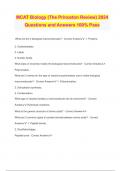
-
MCAT Biology (The Princeton Review) 2024 Questions and Answers 100% Pass
- Exam (elaborations) • 191 pages • 2024
-
- $13.49
- + learn more
MCAT Biology (The Princeton Review) 2024 Questions and Answers 100% Pass What are the 4 biological macromolecules? - Correct Answer️️ -1. Proteins. 2. Carbohydrates. 3. Lipids. 4. Nucleic Acids. What class of enzymes makes the biological macromolecules? - Correct Answer️️ - Polymerases. What are 3 names for the type of reactions polymerases use to make biological macromolecules? - Correct Answer️️ -1. Polymerization. 2. Dehydration synthesis. 3. Condensation. What type of...

Study stress? For sellers on Stuvia, these are actually golden times. KA-CHING! Earn from your study resources too and start uploading now. Discover all about earning on Stuvia



